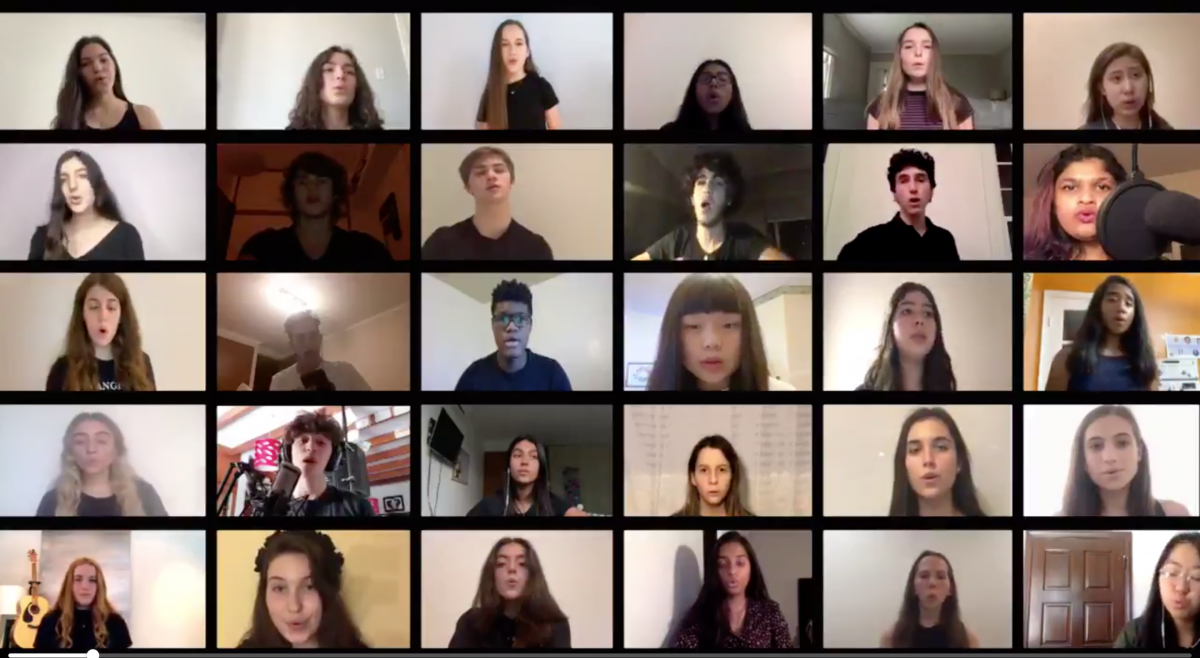Americas Regional Choir by Belgrano Day School
Posted: 26 October 2020

Lead school:
Belgrano Day School
Participating Schools:
- Calgary French and International School (Canada),
- Hotchkiss School (USA),
- Markham College (Perú),
- Chadwick School (USA),
- Craighouse School (Chile),
- Hackley School (USA),
- Saint Andrew’s School (USA) and
- Aubrick Multicultural Bilingual School (Brazil)
Overview
This was a Virtual Regional Choir activity put together during lockdown, in which students from different countries around the Americas were invited to record themselves singing the Beatles’ song “You Won’t See Me”. This project was created as a form of connecting kids through art during these difficult times and at the same time, sharing music as a means to contribute to our communities’ wellbeing and optimism.
Planning
Belgrano Day School had been intending to have a virtual choir experience for some time in the past and we found that the lockdown situation set the grounds to finally give it a try. We picked a song that would be popular and easy enough for everyone to sing and reached out to other schools within the Americas region through Round Square to see if they would like to join in.
After selecting the representative song, our Choir Master made a choir arrangement and prepared its music scores which contained the melodies for each one of the different voices. He recorded audio references for each of the different voice ranges and built a Google Drive folder where all of the videos were uploaded. Also, a guideline document was built in order to make sure everyone was recording themselves according to certain guidelines such as: wearing dark clothes, using a neutral background and facing the camera while singing. We had some teachers meetings to split responsibilities: Global Ed would be in charge of connecting and communicating with schools as well as following up the whole process, the Choir Master would be answering technical questions and in charge of the audio edition, and lastly the design teacher would be mixing audio and videos.
Then we opened applications for schools that wanted to take part in the project. We utilised the Round Square collaboration platform to invite those who might be interested in participating and we were pleased to see that our initiative was well received by many of them. We also followed up with individual schools that we had some connections within past activities. Our aim was to look for around 10 schools from the Americas with 4 students each (three female voices and a male voice).
Details
We were able to put together a strong choir formed by students from Calgary French and International School, Hotchkiss School, Markham College, Chadwick School, Craighouse School, Hackley School, Saint Andrew’s School and Aubrick Multicultural Bilingual School.
The first stage of this initiative was related to defining the project scope and appropriate song selection. Originally a worldwide project was designed for a different song with more voices involved, but because of copyright issues we had to review the approach to transform it into a manageable activity for us and the schools that would be participating.
Afterwards, all schools’ representatives were provided with the instructions for their students to record audio, video, and upload the files to our Drive folder.
A series of emails were sent out during the different stages to keep everyone updated and on the loop as schools were given three weeks to submit their videos. In the first one we welcomed everyone and thanked them for being part of our project. The following mails were simply reminders as the deadline approached. Finally, we sent out an email with the final version of the song and a big thank you to everyone.
Once everyone got their files uploaded, we proceeded with editing them all, to reduce background noises to the minimum and to set everyone on the correct tempo. When the audio files were ready, they were sent to our Digital Media & Design teacher, who was responsible for the video edition.
Lastly, the final product was published on our school’s social media and shared with every other school involved.
Link to Instagram post: https://www.instagram.com/p/CCMQY3UDFvN/
Link to Twitter post: https://twitter.com/BelgranoDay/status/1279155093556858880
Challenges
The first challenge we faced was adjusting the project scale and fulfilling everyone’s expectations around it. It was certainly not a major obstacle, but it required some conversations for everyone to be on the same page regarding project timeframe, countries involved, songs’ copyright issues, number of students participating, and their age. We decided to keep all communication via email rather than finding a suitable time for everyone to join a zoom call.
This project also clashed with the first months of lockdowns in many of the schools involved, including ourselves. Many organizational aspects, teachers and students readjusting to the new modality, were rightly prioritized which sometimes ended in some difficulties to get in touch with all of the school representatives. We came to a point in which we needed to find replacements for some schools that signed up at the beginning but then needed to withdraw along the way. In those cases, we got in touch with schools with whom we had had previous collaborations and were met with enthusiasm to participate.
Timing was certainly a challenge in this project. Considering what was said before about having to invite new schools on the go, the deadlines for uploading the files that we had planned at the beginning needed to be reviewed, as a couple of schools joined some days after the instructions had been sent to everyone. This had a cascade effect on the subsequent deadlines we had planned. Fortunately, every school was able to submit their productions in time and our Regional Choir came together as nicely as we expected.
Also, we encountered some technical problems in the editing process when our teachers’ computer stopped working and there was no way to continue with the edition. As she was the only one possessing not only the needed knowledge, but also the right tools and files to do so, we had no choice but to wait until it was fixed.
As a result, we found some delays on having the final product ready to share. A project that was planned to be finished by May 4th, ended up having the first audio edition by May 29th. A new publishing date was then set to June 22nd, considering the broken computer, and the final video was finished on July 1st. Anyway, I feel that the amazing outcome of this collaboration was worth the wait.
Impact
Many students and teachers got in touch with us to know how the Regional Choir. The final video published on social networks was also shared with all the schools involved, and we were happy to receive plenty of positive feedback such as: “It sure is a fantastic work!!! Congrats to all your team! It’s been such a pleasure to take part! Thanks for inviting us!” (Bianca Caligher, Aubrick, Brazil). “Looks amazing! Thanks soooooo much for putting this together” (Jason Glick, Saint Andrew’s, USA). “Wonderful, thank you so much!” (Chantalle Bourque, CFIS, Canada.) “It moved me. Just lovely. Congratulations to all” (Gabriela Correa, BDS, Argentina).
I trust that this activity will have helped students to grow on their sense of global citizenship and also strengthen the bonds between the schools that participated. I feel that every collaboration we have the opportunity to take part in always sets the stage for future ones, allows school reps to get in touch, and get to know the other RS schools idiosyncrasies, their culture and their own way of understanding life. And that is how we build a greater community. I do hope we will have something similar in the future!
Long term outcomes
Even though this project didn’t involve direct interaction between students, they were left with a sense of belonging to a larger community, especially while they are all staying at home because of the pandemic. Some of the kids that sang in the choir also connected in other regional activities, and I firmly believe this allows them to build stronger international bonds. Of course, they grow and exercise their musical abilities, hitting the right notes and pitch, but one of the most significant things of a choir is that it needs collaboration to stand out. Your voice is extremely important, but wouldn’t make any sense if it wasn’t accompanied by other voices. It’s not only about doing it right but about doing it with others, not so much about making your voice heard as doing it together. In times of social distancing. It’s great to have the kids involved in activities that allow this kind of experience.
Advice
- Work as a team! There are many aspects in this kind of projects: musical, technical, organizational.
- Splitting responsibilities would be wise, as everyone has a specific knowledge that will make them the right person for each task.
- Plan for contingencies. From our experience, planned dates might need to be flexible, so you might want to set an ideal deadline and a no-later-than-this deadline.
- Share clear instructions, make it easy for your partner schools. When so much is going on, it’s easier to participate in a project when you just need to follow a step by step guideline.
- Build a tracker. If you will be dealing with many files and schools and names, a tracker will be handy to know what you are missing and owing.
Author: Daniela Ajzenszlos, Global Ed Coordinator, Belgrano Day School
